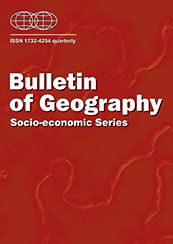The development of low-emission public urban transport in Poland
The development of low-emission public urban transport in Poland
Author(s): Jakub Taczanowski, Arkadiusz Kołoś, Krzysztof Gwosdz, Bolesław Domański, Robert GuzikSubject(s): Environmental and Energy policy, Rural and urban sociology, EU-Approach / EU-Accession / EU-Development, Transport / Logistics
Published by: Wydawnictwo Naukowe Uniwersytetu Mikołaja Kopernika
Keywords: urban transport; low-emission buses; sustainable transport; sustainable cities;
Summary/Abstract: The aim of the paper is to identify the main factors and mechanisms behind the development of low-emission public transport vehicles in Polish cities. This innovation is primarily connected with growing environmental requirements for transport, with the EU environmental and transport policies being the key factors. However, strategies of local governments and municipal transport companies as well as the organization of urban transport - which differs significantly between cities - also play an important role. Three basic types of approach towards low-emission buses can be observed in Polish cities: tests of electric and hybrid vehicles, purchases of small quantities of buses in order to implement new solutions, and finally attempts to replace the majority or even the entire transport fleet with low-emission vehicles. It should be emphasised that an important element which affects the development of low emission public urban transport in Poland is the fact that the country has become one of the main bus producers in Europe - a fact which is a result of both large-scale foreign investments and the success of Polish manufacturers.
Journal: Bulletin of Geography. Socio-economic Series
- Issue Year: 2018
- Issue No: 41
- Page Range: 79-92
- Page Count: 14
- Language: English

